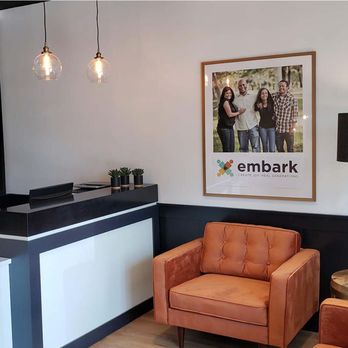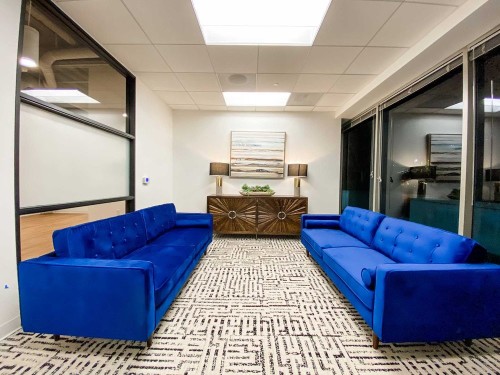





Embark at Newport Beach
Treatment Focus
This center treats substance use disorders and mental health conditions. You'll receive individualized care catered to your unique situation and diagnosis, learn practical skills for recovery, and make new connections in a restorative environment.
Primary Level of Care
Outpatient treatment offers flexible therapeutic and medical care without the need to stay overnight in a hospital or inpatient facility. Some centers off intensive outpatient program (IOP), which falls between inpatient care and traditional outpatient service.
Claimed
Recovery.com has connected directly with this treatment provider to validate the information in their profile.
Treatment Focus
This center treats substance use disorders and mental health conditions. You'll receive individualized care catered to your unique situation and diagnosis, learn practical skills for recovery, and make new connections in a restorative environment.
Primary Level of Care
Outpatient treatment offers flexible therapeutic and medical care without the need to stay overnight in a hospital or inpatient facility. Some centers off intensive outpatient program (IOP), which falls between inpatient care and traditional outpatient service.
Provider's Policy
We will walk you through the steps of verification of benefits, determining if you have the proper coverage to bill the insurance, what the authorization process entails, and submitting claims to the insurance for coverage. Insurance coverage may vary by location.
Embark at Newport Beach
Embark at Newport Beach
About Embark at Newport Beach
What They Treat
Embark at Newport Beach specializes in the diagnosis and treatment of adolescents and families struggling with mental health and behavioral disorders. Some of the more common conditions they treat include anxiety, depression, and suicidal ideation. Other mental illnesses they can address are eating disorders, obsessive-compulsive disorder (OCD), attention-deficit hyperactivity disorder (ADHD), post-traumatic stress disorder (PTSD), bipolar, borderline personality disorder (BPD), family conflict, social isolation, and technology addiction. Patients and their families participate in creating individualized treatment plans that will meet their specific and unique needs. The knowledgeable and experienced staff at Embark use evidence-based treatment methods such as dialectical behavior therapy (DBT), trauma-focused cognitive behavioral therapy (TF-CBT), and self-management and recovery training (SMART) addiction counseling.
Partial Hospitalization Program
The partial hospitalization program (PHP), commonly known as the therapeutic day program at Embark, is their most intensive level of care. The therapeutic day program supports patients who are transitioning out of a residential treatment program or seeking a more intensive level of care in comparison to what the other outpatient programs provide. Day treatment often consists of 27-30 hours of treatment spread out over 5 days per week while patients remain living at home. In addition to 1-on-1, group, and family therapy, Embark's educational services allow students to continue their academic work and gain credits that can be transferred back to their school.
Intensive Outpatient Program
Their intensive outpatient program (IOP) allows participants to continue with their individualized treatment plans and attend group and individual therapy sessions while requiring less of a time commitment. Intensive outpatient is group-focused and involves attending sessions 3-4 days per week for 3 hours per day. In addition to group sessions, patients also continue with their individual therapies and family counseling services. The intensive outpatient program (IOP) takes place in the evenings in order to accommodate school and work schedules, allowing youths and their families to receive treatment while still attending to their every-day responsibilities. When patients are ready for a less intensive level of care, Embark’s continuum of care allows for outpatient 1-on-1 therapy to continue on a weekly or bi-weekly basis, as well as offering virtual or in-home counseling services for individuals and their families.

Center Overview
Treatment Focus
This center treats substance use disorders and mental health conditions. You'll receive individualized care catered to your unique situation and diagnosis, learn practical skills for recovery, and make new connections in a restorative environment.
Joint Commission Accredited
The Joint Commission accreditation is a voluntary, objective process that evaluates and accredits healthcare organizations (like treatment centers) based on performance standards designed to improve quality and safety for patients. To be accredited means the treatment center has been found to meet the Commission's standards for quality and safety in patient care.
Insurance Accepted
Cash Pay Rates
Estimated Cash Pay Rate
Center pricing can vary based on program and length of stay. Contact the center for more information. Recovery.com strives for price transparency so you can make an informed decision.
Levels of Care








Your Care Options
Specializations
Outpatient
During outpatient rehab, patients attend a structured treatment program while continuing to live at home.
Adolescents
Teens receive the treatment they need for mental health disorders and addiction, with the added support of educational and vocational services.
Who We Treat
Young Adults
Emerging adults ages 18-25 receive treatment catered to the unique challenges of early adulthood, like college, risky behaviors, and vocational struggles.
Adolescents
Teens receive the treatment they need for mental health disorders and addiction, with the added support of educational and vocational services.
Approaches
Experiential
Expressive tools and therapies help patients process past situations, learn more about themselves, and find healing through action.
Evidence-Based
A combination of scientifically rooted therapies and treatments make up evidence-based care, defined by their measured and proven results.
Family Involvement
Providers involve family in the treatment of their loved one through family therapy, visits, or both–because addiction is a family disease.
Individual Treatment
Individual care meets the needs of each patient, using personalized treatment to provide them the most relevant care and greatest chance of success.
Therapies
1-on-1 Counseling
Patient and therapist meet 1-on-1 to work through difficult emotions and behavioral challenges in a personal, private setting.
Family Therapy
Family therapy addresses group dynamics within a family system, with a focus on improving communication and interrupting unhealthy relationship patterns.
Acceptance and Commitment Therapy (ACT)
This cognitive behavioral therapy teaches patients to accept challenging feelings and make the appropriate changes to reach personal goals.
Psychoeducation
This method combines treatment with education, teaching patients about different paths toward recovery. This empowers them to make more effective decisions.
Eye Movement Therapy (EMDR)
Lateral, guided eye movements help reduce the emotional reactions of retelling and reprocessing trauma, allowing intense feelings to dissipate.
Conditions We Treat
Post Traumatic Stress Disorder
PTSD is a long-term mental health issue caused by a disturbing event or events. Symptoms include anxiety, dissociation, flashbacks, and intrusive thoughts.
Anxiety
Anxiety is a common mental health condition that can include excessive worry, panic attacks, physical tension, and increased blood pressure.
Depression
Symptoms of depression may include fatigue, a sense of numbness, and loss of interest in activities. This condition can range from mild to severe.
Suicidality
With suicidality, a person fantasizes about suicide, or makes a plan to carry it out. This is a serious mental health symptom.
Obsessive Compulsive Disorder (OCD)
OCD is characterized by intrusive and distressing thoughts that drive repetitive behaviors. This pattern disrupts daily life and relationships.
Internet Addiction
Internet addiction is common among children teens. This compulsive disorder can damage relationships, school performance, sleep habits, and physical health.
Personality Disorders
Personality disorders destabilize the way a person thinks, feels, and behaves. If untreated, they can undermine relationships and lead to severe distress.
Bipolar
This mental health condition is characterized by extreme mood swings between depression, mania, and remission.
Trauma
Some traumatic events are so disturbing that they cause long-term mental health problems. Those ongoing issues can also be referred to as "trauma."
Substances We Treat
Co-Occurring Disorders
A person with multiple mental health diagnoses, such as addiction and depression, has co-occurring disorders also called dual diagnosis.
Drug Addiction
Drug addiction is the excessive and repetitive use of substances, despite harmful consequences to a person's life, health, and relationships.
Alcohol
Using alcohol as a coping mechanism, or drinking excessively throughout the week, signals an alcohol use disorder.





